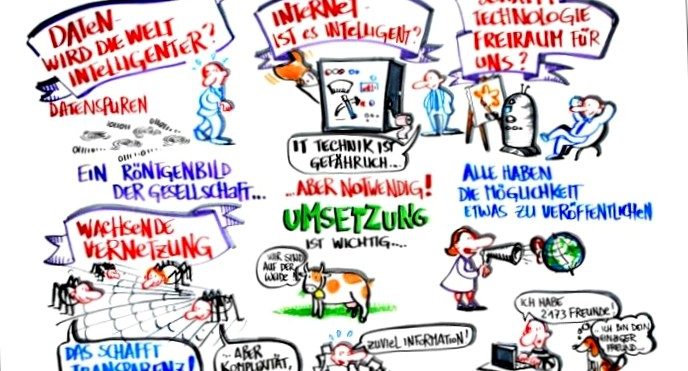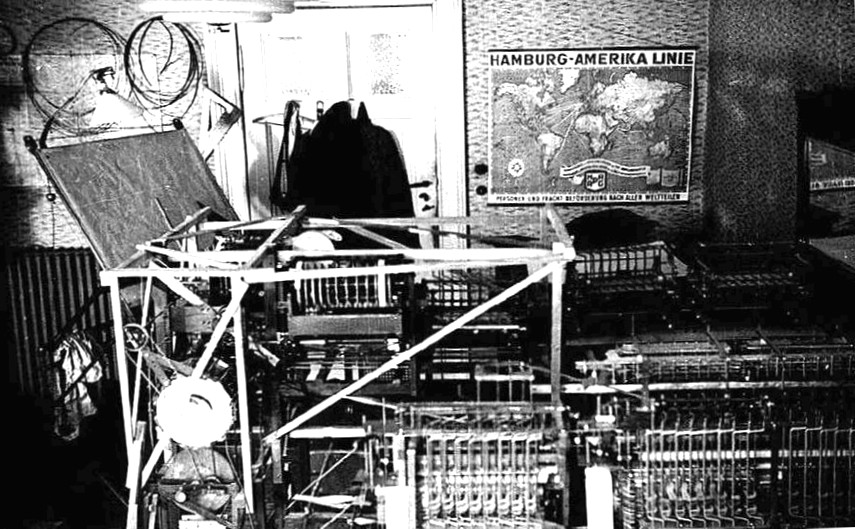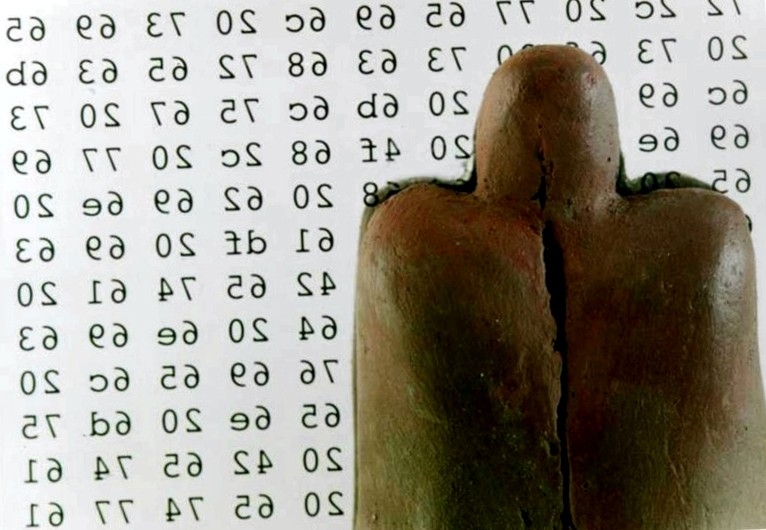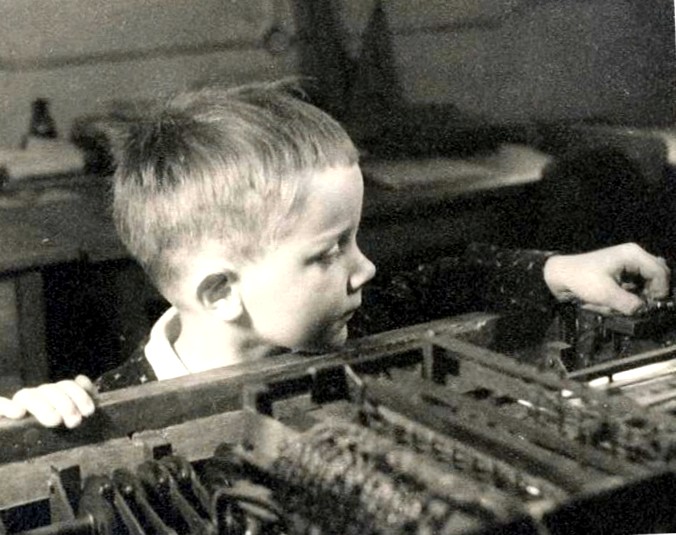Facebook: the new church?

To make a long story short: a "scribing" by lucia fabiani on the itaforum 2011
How voluntarism becomes a community of constraints
More than 80 percent of facebook users have given their real names. Mark zuckerberg knows why: they like to share their information. Almost a christian act, among brothers and sisters. They are not afraid of losing their privacy? Or do they even feel a pleasure in the personal exposure in the choir of the church? Most of them know the business model of facebook in general, but do not care in detail about the interconnections and bundles of data paths that run past them while they are feeding in. They know it, but they do it anyway. The veil of opacity of web2.0 filters their concerns. They say: we can’t do anything about it anyway.
How does this traumatized attitude come about?? Surely not just by zuckerberg, the boy next door, saying: "they trust me, these idiots." why do you make a mistake on the web, only to make a mistake again as soon as you have repented (of the time)?? The social philosopher adorno has already for the 20th century. Century defined communication negatively: everybody talks, but not with each other. An indifferent noise. In the compression to a ubiquitous space-time, which makes us placeless, loneliness is only to be endured by non-stop talking, the old fear consciousness. Is there who? It is the self-arance, if not the self-absorption of narcis, who in the mirror of the water and in the echo of his words does not recognize that his counterpart is himself.
On the net we can do everything ourselves: we edit our texts and photographs, form ourselves into riots and overthrow regimes. We are allowed to empower ourselves. But just as the ancient narcissist lacked companionship, social media are replacing something that has long been "talking to each other" is embossed: the family. Psychoanalysis calls this process ego ideal substitution. Old impotences are exchanged for stronger ones. Everyone is allowed to participate in everything in the unleashed horde of brothers and sisters. We live in a free web country. We. This is the corporate sound.
It’s like in kafka’s "kafka’s castle". The desire to be part of it, demands horror. One desires entrance by a click and is already recognized as a repeat offender, now also by photo. And is there any better marketing than the recommendation by our friends, who are the "like-my"-view button?1 who are our friends? According to a study, for every 130 facebook friends, there are 6.6 real friends. But who is our best friend? We ourselves, see above. We are in the forecourt of advertising, where, as vance packard2 found out decades ago, the questions are answered in a roundabout, amusing and seemingly value-free way: who am i? Who do i want to be? How do i want to be loved? By whom? What can i do?
At a conference on iuk technologies organized by the ministry of research, karin frick suggested that instead of calling the gross data collectors "big brother" it would be better to speak of "big mother" to speak. We get advice on the net when we are sick and when we want to shop. We are cared for and nurtured. Frick added that the subliminal theme of careful care and gifting is the most important gateway of advertising, which appeals to us in a general human way. But: "you are not the customer in this (social web) network, the customer is the advertising industry. You yourself are the product."3
It is often said that "human interface" spoken. The real interface, however, as opposed to that of the transition from reality to virtuality, is the transformation of social relations into things that become manageable. Be it that we are connected to the network of things in the ubiquitous city, be it that our thinking becomes the circuit function of the collective world memory. What do neuronal researchers actually look for in the human brain?? You should search above. Konrad zuse already suspected: "the danger that the computer will become like man is not as great as the danger that man will become like the computer.

How it all began: the first computer built by konrad zuse (1938). Underneath the hardware: vacuum cleaner motors and foliage work. Image: private archive horst zuse
Does it help to identify ourselves as participants in the "gated web community" by adopting a fake identity?? Data protection officer marit hansen points out that such users, lulling themselves into a sense of security, become all the more careless when surfing the web. They are manipulated simply by believing that they cannot be manipulated. Restrictions of facebook’s functions to smaller communication spaces in order to maintain privacy must first be worked out by the user in the jungle of regulations, because they are not in the spirit of the inventor.
But this kind of freedom of choice is at the same time a useful argument for facebook. When privacy advocates object to the transfer of data to third parties, facebook counters that it was, after all, the users themselves who uploaded the data and provided them with the relevant disclosure clauses. The burden of proof is reversed: "it’s your own fault!" the global (web) players slip through the cracks between overtaxed data protection experts and a shirt-sleeved interior minister. There is circumstantial evidence for the shirtlessness. The minister does not seem to be unhappy about the practices of commercial data collection and dissemination, because the security authorities are "behind it". This is the next dilemma: is the state the adequate guarantor of a data protection that it itself is inclined to violate when it comes to its own surveillance purposes?? "State trojan" – the word is as apart as the code is long.
From cough to tsunami
The "big dater" attach themselves – with the help of cookies – to the traces of our web journeys, and the accumulation of data gradually builds up into a personal dossier. This also involves non-members of facebook, but the effectiveness of the method lies in targeting user groups whose emotional surfing motive is a hybrid of self-absorption and sickness. However, who can claim to be completely free of this?? Accordingly, it would be the potential majority, which in turn voluntarily contributes to the creation of their respective social and psychological profiles. What others spread about one on the net gradually overlays what one makes known about oneself, until one has unconsciously adopted the image of others. To be is to be perceived. The online image dominates the offline image. The image swallows up reality.
It’s then too late for a facebook exit under one’s own steam. 80 years ago, the sociologist alfred schutz outlined a social behavior pattern of the individual that anticipated the web age: i present myself in the way i think others see me. But, had to be connected, in the result there is the one and the other no more. All are "generalized others" become. All speak the same world language, the jargon of the "generalized other". Already on the occasion of the first transatlantic telegraph cables, which love to bring the old world together with the new world by accelerating the transmission to the global village, h.D. Thoreau: "perhaps, however, the first news that trickles into the coarse american lop ear is: princess adelheid has the whooping cough."4 has the whole world the cough today?

The big brother award, the oscar for data octopuses, went to facebook in 2011 in the communications category; another to apple. Bild: thorsten moller / foebud
"Facebook against any injustice" banners of the "facebook-revolution" in the arab countries. The social web provided the democratic platform. But not the political content, but "the medium is the message", according to marshall mcluhan. The digital tsunamis that drove the masses to action on the streets are no different in form from campaigns in the age of the "mass customization", ernuchterung on "day after" included. Product campaigns are best run when they are underfed and managed with people-to-people campaigns. At this point conspiracy theories emerged. Is the cia behind it?? Hardly, but conspiracy theories confirm themselves in each case. They are the supposed revelation of a cloak. But the revelation, in turn, succumbs to the aura of seduction: the unmasked "altbose enemy" (with luther the devil) remains mystical and powerful, all the more threatening.
And what if the cia itself had spread the rumor of its involvement, so that it would be denied?? The informational offerings of the web are sucked into an inextricable spiral fog of exposure and disinformation. It is like the race between hare and hedgehog. The exchange is faster. The originators or sources of news become unrecognizable as claims are made from somewhere and confirmed by repetition or imitation. This scheme is well known from prejudice research. The sword of the arab protest was finally directed against the mass movement itself. Every facebook demonstrator was allowed to feel part of the whole, but the whole turned out to be one thing: the state with its organs of surveillance and repression, which traced the digital footprints of the mass movement to the "to the masterminds" to the masterminds. In verhor their friends were already known to the interrogators. The friends-find game.

The world’s first nerd? Horst zuse, now a computer science professor, plays on his father’s z4 calculator in 1949. Image: horst zuse private archive
Finally, social networks offer three achievements that go beyond civil society and formal democracy:
- Overcoming shame and embarrassment. In the chat room, the user has the feeling of not getting into embarrassing situations so quickly. Nobody needs to be embarrassed. Unabashed voyeurism also launched zuckerberg’s career (facemash). The consequences are unforeseeable, since norbert elias has identified shame, embarrassment and the intimacy of personal space as the very characteristics of the emergence of our civilization.
- The general availability. Knowledge, including knowledge about others, is immediately at hand and serves self-affirmation through control over the actions of community members. The technology inspires the imagination until it seems to be omnipotent. It is a fantasy of immortality. Even if all falls in old age are reported to the central office by sensors, the real process of increasing loneliness, called dying, will not be made easier by the virtualization of life. The aging of the facebook generation is becoming a trauma, the virtuality is suddenly taking hold.
- The mach mit society. The offers of participation are mostly structured in such a way that what is desired by the provider comes out, and the user also playfully gives his data to the best. A high point of the interacting loves itself a rough meatball roaster: "build your burger and become famous." as bertolt brecht wrote? "Only the most stupid calves build their own burger." or something like that.
